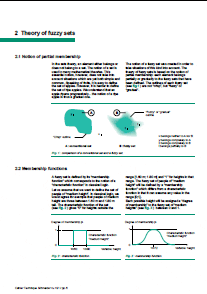Control systems
Initially a theory, today fuzzy logic has become an operational technique. Used alongside other advanced control techniques, it is making a discrete but appreciated appearance in industrial control automation systems.
Fuzzy logic does not necessarily replace conventional control systems. Rather it completes such systems. Its advantages stem from its ability to:
- formalise and simulate the expertise of an operator or designer in process control and tuning,
- provide a simple answer for processes which are difficult to model,
- continually take into account cases or exceptions of different kinds, and progressively incorporate them into the expertise,
- take into account several variables and perform “weighted merging” of influencing into variables.
How does this technique contribute to industrial process control? What is the effect on product quality and manufacturing cost? Following a few basic theoretical notions, this Cahier Technique answers the questions asked by automatic control engineers and potential users by means of industrial examples, in terms of implementation and competitive advantages.
Fuzzy logic today
In the majority of present-day applications, fuzzy logic allows many kinds of designer and operator qualitative knowledge in system automation to be taken into account. Fuzzy logic began to interest the media at the beginning of the nineties. The numerous applications in electrical and electronic household appliances, particularly in Japan, were mainly responsible for such interest. Washing machines not requiring adjustment, camcorders with Steadyshot (TM) image stabilization and many other innovations brought the term “fuzzy logic” to the attention of a wide public.
In the car industry, automatic gear changes, injection and anti-rattle controls and air conditioning can be optimized thanks to fuzzy logic. In continuous and batch production processes, as well as in automation systems (which is the subject of this Cahier Technique), applications have also increased. Fuzzy logic has developed in this area as it is an essentially pragmatic, effective and generic approach. It allows systematisation of empirical knowledge and which is thus hard to control. The theory of fuzzy sets offers a suitable method that is easy to implement in real time applications, and enables knowledge of designers and operators to be transcribed into dynamic control systems.
This makes fuzzy logic able to tackle automation of procedures such as startup and setting of parameters, for which few approaches were previously available. This Cahier Technique describes fuzzy logic and its application to production processes.
AUTHOR: Schneider Electric experts | François CHEVRIE, François GUELY
| Title: | Fuzzy logic |
| Format: | |
| Size: | 0.4MB |
| Pages: | 32 |
| Download: | Right here | Video Courses | Membership | Download Updates |


